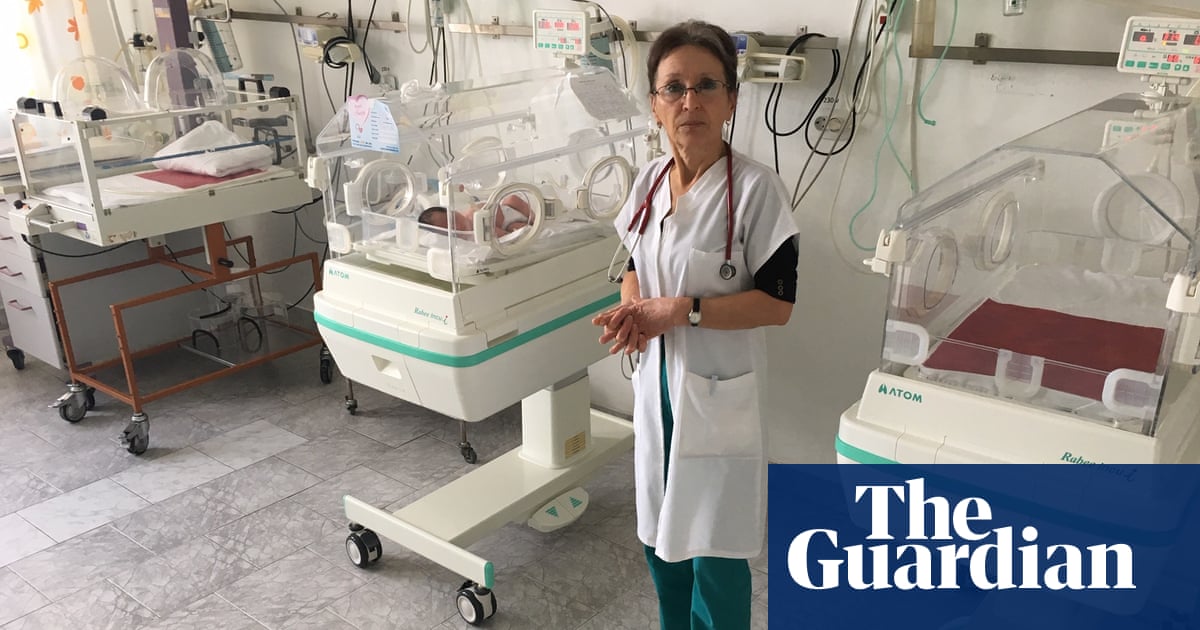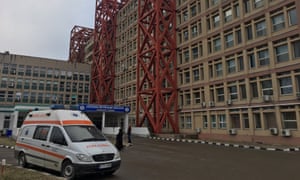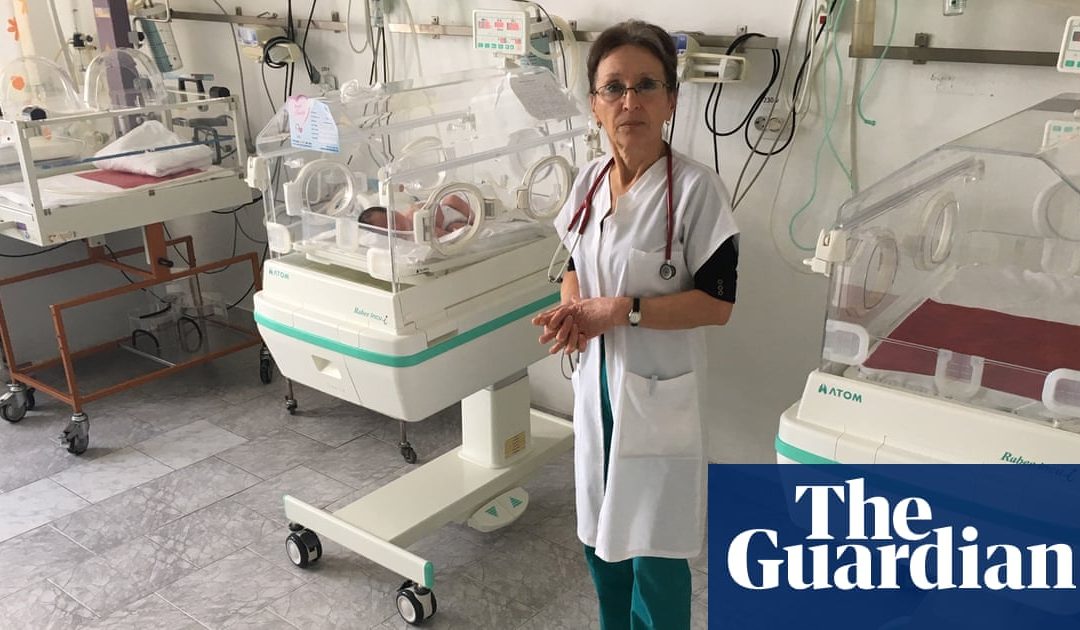Thousands of doctors and nurses have left Romania in past decade, leading to dire staff shortages

Gabriela Dumitru was supposed to retire years ago, but instead, shes working longer hours than ever before. The 65-year-old is one half of a team of two doctors at the neonatology ward in Slobozia, a depressed town about two hours drive from Romanias capital, Bucharest.
Dumitru works three or four 24-hour shifts a week, catching an hour of sleep where possible on a sofa in a small box room decorated with pictures of kittens. Her colleague is 75, and he officially retired 15 years ago. Between them, they do the work of four or five doctors, delivering approximately 1,200 babies a year and caring for those born with difficulties or disabilities.
The neonatology ward in Slobozia is a small window into a larger crisis in Romania, where thousands of doctors and nurses have left the country for higher salaries in western Europe over the past decade. In turn, Romanias medical crisis is a small part of the huge outflows of people from central and eastern European countries since they gained membership of the EU.
Across the region, governments are struggling to deal with the consequences of many of their most talented young people leaving and while many politicians in the region have played on fears of immigration to win support, research has shown that concern over emigration is more acute. In a recent survey, more than 50% of Romanians said they were concerned about the impact of emigration on the country, the highest figure among all the countries studied.
An estimated 3.4 million Romanians left the country in the decade after EU accession, according to a study by Romanian business leaders, while the ministry of health estimates that 43,000 doctors departed during the period. A study by the US-based Population Reference Bureau, meanwhile, forecast Romanias population will fall by 22% by 2050, the steepest projected global decline, due to a combination of emigration, high mortality and low birth rates. Neighbouring Bulgaria has a similarly worrying forecast.
Quick guide
Depopulation in Europe
In many parts of Europe, the issue of depopulation of the countryside, regions, or in some cases whole countries, weighs on the minds of politicians and the public, as an era of freedom of movement means more people are able to migrate to find better opportunities.
A recent study by the European Council on Foreign Relations showed that in Spain, Italy, Greece, Poland, Hungary and Romania, countries where the population has either declined sharply or is flatlining, more people are worried about emigration than they are about immigration.
The problem is felt acutely in central and eastern Europe, where populations have shrunk dramatically in the decades since the fall of communism, due in part to the traumatic effects of the transition, with high mortality rates, low birth rates, and millions of people travelling to western Europe to seek higher salaries, especially in the years after EU accession. In Bulgaria, for example, the population has shrunk from 9 million to 7 million since 1989.
In Ialomia county, of which Slobozia is the capital, 44% of all positions for doctors are vacant, according to the most recent ministry of health statistics available. Across the country, the figure is 26%, meaning that the country is paying to train young doctors who then leave.
In Slobozia, a new doctor was meant to join the neonatology ward last November, said Dumitru, after the hospital had funded a training residency at a Bucharest hospital to prepare her for the job, but she simply disappeared after completing the training. It was not the first time the hospital was let down by a new hire abandoning them.
Raed Arafat, Romanias secretary of state for emergency situations, and himself a doctor who previously ran emergency medicine in the city of Trgu Mure, said the first wave of migration came before Romania joined the EU in 2007, with many nurses travelling to Italy. Back then, we lost our entire contingent of nurses in Trgu Mure in the space of two years, then we trained new ones and immediately lost half of those as well, he recalled.
When the economic crisis hit a year after EU accession, things got really bad. We lost doctors we thought would never leave, the most highly qualified physicians. It had an impact that couldnt be repaired, said Arafat. He said the country was suffering from a particular shortage of emergency physicians and anaesthetists.
Joining the EU provided huge opportunities for talented young Romanians to travel, study and work in western Europe, drawn by higher salaries and more opportunities. There are dozens of flights a day from airports across Romania not only to London, Paris and Rome but to many smaller regional cities where tens of thousands of Romanians have travelled for work. But it has left huge gaps in the labour market at home.
In an attempt to stem the flow of medical professionals leaving the country, the government has doubled wages in the sector over the past year, but the struggle to retain talented people is particularly acute in many of Romanias provinces, where economic potential is limited.
In Slobozia, there are few opportunities locally for anyone with ambition. Large multicoloured letters spelling out the towns name face on to the main square, an effort to brighten up the surroundings, but there is little for young people to do and few buildings constructed since the collapse of communism.

At the modest offices of the local newspaper, the journalist Andrei Banu shrugged his shoulders when asked if there was anything to do in Slobozia, and laughed when asked if young people saw much of a future in the town.
It is not just the skilled workers who have left the country. There are 3 million Romanians living abroad, many of them with low qualifications, and without this wed have huge rural unemployment, said Cristian Ghinea, the vice-president of the Save Romania Union. The real tragedy is that the system is not changing enough to attract them back here. His party plans to campaign in European elections next month with the slogan: We will bring back your children.
The government hopes that increased salaries in the medical sector will be a turning point in the outflow of medical professionals, but so far the results are not promising. The education minister, Ecaterina Andronescu, said earlier this year that 10,000 doctors left Romania in 2017 and 2018.
The vast majority who left the country did so for economic reasons, said Clin Popescu-Triceanu, the speaker of the Romanian senate. The government had implemented dramatic wage increases, he said, to put a brake on this unfortunate and unpleasant movement. He admitted, however, that the results so far had been less than impressive.
Popescu-Triceanu said he hoped Brexit would provide an impetus for Romanian doctors and nurses working in the UK to return home and cited a nurse he knew who was being called by friends who had left to work in Britain to ask if the stories they had heard about increased salaries in Romania were really true.
Arafat said the country could be sure that people would no longer leave for money, but said the system was burdened with needless bureaucracy, meaning even if doctors want to return they may have to wait for months to do the paperwork. We need a proactive programme to get these people back, he said.
In Slobozia, Dumitru conceded that working conditions in the hospital had improved dramatically since the dire situation in the 1990s inherited from Nicolae Ceauescus isolated communist state, when she started work. She also welcomed the salary increase. But, she said, money is not everything.
I remember 25 years ago Id have to wipe down newborns on a snowy window ledge just after a C-section, she said. Now we have all the equipment we need, and salaries have gone up. But its not just about money, we have to change absolutely everything, including the mentality in society, if people are going to want to stay here and work.
Additional reporting by Laurentiu Colintineanu


Recent Comments